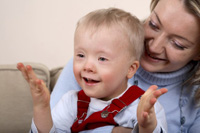Program Details
 Fellows have a multitude of diverse outpatient experiences which help them develop their expertise in the clinical diagnosis and management of developmental delays and disabilities and associated behavioral challenges. The wide range of conditions we treat include but are not limited to autism, intellectual disability, fetal alcohol spectrum disorders, complex ADHD, cerebral palsy, spina bifida, and developmental differences associated with genetic conditions.
Fellows have a multitude of diverse outpatient experiences which help them develop their expertise in the clinical diagnosis and management of developmental delays and disabilities and associated behavioral challenges. The wide range of conditions we treat include but are not limited to autism, intellectual disability, fetal alcohol spectrum disorders, complex ADHD, cerebral palsy, spina bifida, and developmental differences associated with genetic conditions.
The research activities of Developmental and Behavioral Pediatrics are far-ranging and diverse, but all focus on clinically relevant concerns related to the health and well-being of children with developmental delays and disabilities.
Fellows are an integral part of the division of Developmental and Behavioral Pediatrics and work with the team in serving as a resource to the community and teaching other trainees within the University of Rochester.
Program Highlights
Excellence in Patient Care and Research
In addition to our busy clinical and didactic programs, Developmental and Behavioral Pediatrics is the site of:
- The Strong Center for Developmental Disabilities, a University Center for Excellence in Developmental Disabilities
- The Autism Care Network, a network of 24 academic institutions and children’s hospitals and physicians across the U.S. and Canada dedicated to improving the care and quality of life for individuals with autism by connecting families, researchers, and healthcare teams to advance research developments and clinical knowledge
- Multiple other NIH-supported research activities
New Children’s Hospital
In the summer of 2015, UR Medicine opened a brand new Golisano Children’s Hospital, a $145-million building attached to URMC and Strong Memorial Hospital, dedicated solely to children and their families.
The University of Rochester is home of Engel’s Biopsychosocial Model of medicine which emphasizes a comprehensive approach to clinical care for our patients.
Individualized Curriculum
Our Developmental-Behavioral Pediatrics Fellowship curriculum may be modified to meet individual career interests; fellows focus on areas of developmental-behavioral pediatrics as diverse as foster care, immigrant health, NICU follow-up, health care delivery, and public health advocacy.
Interdisciplinary Leadership Training
Our fellows receive interdisciplinary leadership training in thirteen professional disciplines related to neurodevelopmental disabilities through the LEND program. We work in close collaboration with nurses, psychologists, occupational and physical therapists, speech pathologists, nutritionists, audiologists, educators, and social workers, as well as dentists, orthopedists, urologists, neurologists, neurosurgeons, and geneticists in the treatment of patients.
Research Opportunities
NACHRI recently ranked the Department of Pediatrics 15th in NIH funding based on total dollars awarded, ranking just below Yale University, demonstrating significant research opportunities available to our fellows. The department provides financial support for each fellow to present at one national conference per year. Our fellowship program offers significant time and support for fellows to pursue their research in years 2 and 3
Mentorship
We pride ourselves on the strong guidance and mentorship that our program director and faculty provide our trainees. The Chair of the Department of Pediatrics and/or Dr. Patricia Chess, Vice Chair of Education, meet quarterly with fellows from our subspecialty training programs in an informal roundtable setting to offer mentorship and research guidance.
Continuous Funding
Our DBP and LEND programs have been fully funded for over fifteen years. In addition, the Department of Pediatrics has been awarded multiple T32 training grants.